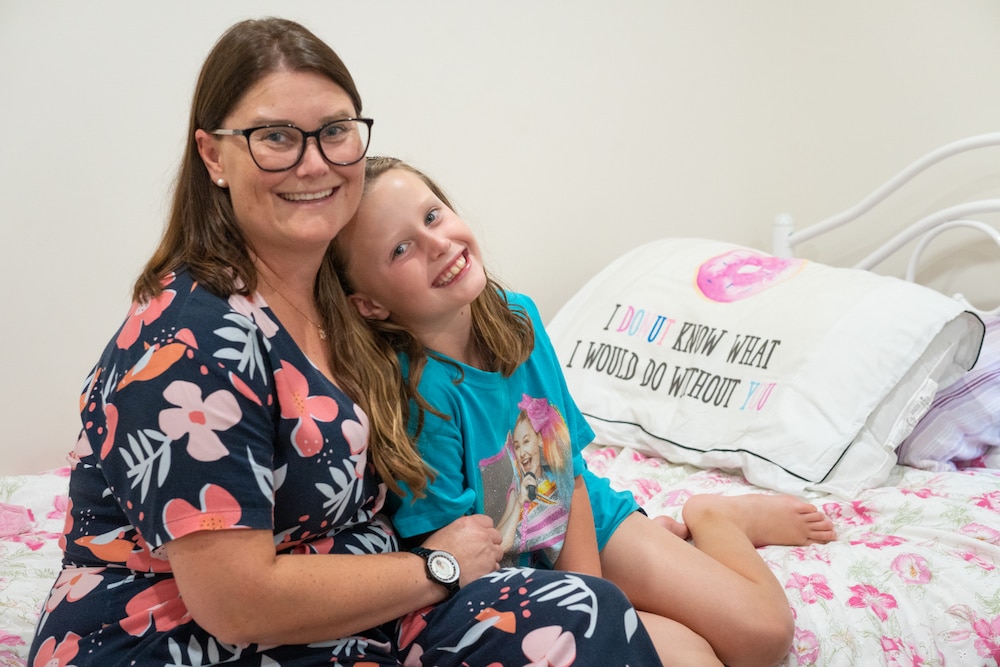The Burke family can see light at the end of the tunnel after five months of uncertainty following their eight-year-old daughter Audrey’s epilepsy diagnosis.
The month of March marks Purple Month, and as the Walk For Epilepsy approaches this Sunday 7 March, the family are sharing their daughter’s story to help increase awareness of the often-stigmatised condition and to support Epilepsy ACT. The not-for-profit, self-help community service organisation provides support, reassurance, advocacy, referral and information to people with epilepsy, their families and the Canberra community.
Although a sufferer of epilepsy herself when she was younger, Rebecca Burke, Audrey’s mother, said her daughter’s diagnosis was still a shock.
“A lot has changed and evolved since I was diagnosed. The terminology, research, treatments, the awareness of the different types of seizures that people can have, it had all changed, and it was a process of learning again,” she said.
“Audrey can be quite funny and silly, so it was just one of those moments. I didn’t recognise it … I haven’t had a seizure for quite some time, so it wasn’t something that was at the front of my mind.”
Audrey’s epilepsy began to show through myoclonic seizures, which consist of sudden body and limb jerks and noises. It wasn’t until Audrey’s older sister Eva started to mention Audrey having “these moments” more regularly and through their own observations that the Burkes realised something bigger was going on and went straight to the hospital.
“Audrey had EEGs in the hospital and an MRI because we weren’t sure it was epilepsy. We went over a week in hospital to get a confirmed diagnosis,” Mrs Burke said.
“It was a bit of an emotional rollercoaster for myself and my husband Ray. It was very traumatic, not just on myself and my husband but also on the other children.”
Fiona Allardyce, CEO of Epilepsy ACT, said many schools don’t realise that one in 200 students have epilepsy and over 8,000 Canberrans will be diagnosed with epilepsy at some point in their lifetime. However, this statistic could be a lot higher as there are epilepsy suffers who live their entire lives undiagnosed and untreated.
“You would be surprised by how many people, once you start talking about it, will know someone or have epilepsy themselves.”
According to Ms Allardyce, there is a stigma surrounding epilepsy because “people don’t understand it”.
“There’s so many different types of epilepsy. It’s not just what you see in movies, it can be something like a myoclonic jerk, which is just movement of the arms, or it can be an absent seizure where they space out for a couple of seconds and they look like they’re just daydreaming,” she said.
“Sadly, there is still stigma surrounding epilepsy with some parents, and even teachers fear the disclosing of a diagnosis. This creates a dangerous situation as epilepsy is ranked in the top five causes of avoidable death in the five to 29 age group.
“Schools can overcome this fear of discrimination by proactively becoming an Epilepsy Smart School, giving students and teachers with epilepsy the confidence to be open about how to help them in the event of a seizure.”
Mrs Burke said Audrey’s school and doctors have provided much needed support for her daughter but there is a need for greater community awareness as “the stigma and the taboo that comes with epilepsy is you might be weird or different”.
“You can have a normal functioning life. You can drive a car, you can have a family, you can play sport. Audrey can do all of those things, she goes to school and she’s still her happy little bubbly self,” she said.
“It’s just challenging for the first period of time; it’s just working together and moving forward. There is light at the end of the tunnel.”
The Walk For Epilepsy aims to rasie awareness and funds to support locals with epilepsy, like Audrey. According to Ms Allardyce, Epilepsy ACT aims to help start a conversation about the condition.
“We talk about other conditions that come on quite quickly and that can be life-threatening like asthma and anaphylaxis. Realistically, people don’t have a problem talking about those and we want epilepsy to be spoken about in the same way,” she said.
Registration for The Walk For Epilepsy starts at 9.15am on the day and the Walk will begin at 10am at Commonwealth Place, Lake Burley Griffin. The bridge-to-bridge course is fully accessible to mobility scooters, wheelchairs and prams. Dogs on leads are also welcome.
Find out more information or register at epilepsyact.org.au
For more Community:



